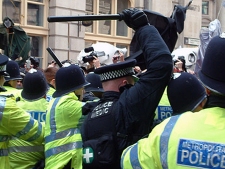The most salient similarity between the two inordinately long, one might almost say ’19th Century’, regimes that have dictated our lives for the past forty years is the way the markets reacted to them (of course, they pursued unexpectedly similar financial policies). In both cases, they were positioned for their launch into extremism by a very strong economic position they had precisely nothing to do with creating. North Sea oil and gas was almost entirely paid for by Labour and then sold by the Tories, to their own advantage. This also more or less describes the public infrastructure that was privatised, though several Tory governments had helped build that. The Internet and mobile phone booms were not only not helped by New Labour, they were actively and systematically handicapped.
Both regimes exploited the strength of their perceived position as winning teams to orchestrate subtle, and then not-so-subtle, witch-hunts. Bizarrely, in the case of Thatcher’s social services, there was a literal witch hunt. As Reagan was expanding Nixon’s War on Drugs into Wars on other things, Thatcher was declaring war on organised labour, Irish travelers, peace-protesters, environmentalists and the counter-culture in general. And she was winning, because let’s face it, if you smash all the news men’s cameras and if you’re just beating up a gang of filthy hippies and left-liberal wets, why would middle England care? It’s not like your party will ever need the votes of the liberal and progressive middle class. Er, hang on…
Labour, having surfed into Cool Britannia on a wave of BritPop pizzazz, shambled to the right over the War on Terror and then proceeded to abandon the world of rationality all together. Evidence became a deprecated practice, science policy was subjected to political speculation and short-term party interest. The rational but leftist economic inspirations of a young Scottish Presbyterian in the 80s turned into slavish neo-Thatcherite greed in office in the 2000s. The hysterical Christian wing of the Labour Party are just as terrifying as Christina Odone and Nadine Dorries.
Why did I justify typing all of that when I’m lurking deep within the bowels of a pile of boxes significantly higher than my head, moodily smoking and wishing I’d had more than 4 hours sleep at any time this week? Patience, gentle reader, good things come to those who wait.
The last and most significant parallel I need to draw is between Black Wednesday and the collapse of Northern Rock. In both instances of over-long government by a functional dictatorship (full majority in the commons) their term saw the collapse of significant chunks of the Square Mile boom the government had been exploiting to maintain its autarchy. And unlike what usually happens, where a government is lucky to get ten straight years and very lucky to get ten years of a more or less free hand to legislate, in both cases the economic failure actually had been engineered by the incumbents, not the last guys.
Thatcher over-clocked the economy quite deliberately to gain the largest possible advantage from the North Sea, the privatisation binge, and the world-wide economic and financial boom that accompanied the rise of the Tiger economies. Most governments who run their economy too fast with inadequate cooling are safely out of office when the magic smoke escapes. The Tories weren’t, and David Cameron bloody well knows it; he was standing behind Lamont when the Chancellor announced an interest base rate of 15%.
Unexpectedly, Brown’s Chancellorship saw New Labour follow exactly the same pattern. The City was given its head, the communications boom was exploited ruthlessly while its lucrative consumers, mostly under 30, were demonised in Westminster and Wapping alike. The housing market boom was then artificially inflated well beyond its natural term to off-set the horrendous costs of the War on Terror. The Rock did not fall over because it was heavily invested in US sub-prime instruments, it was a home-grown collapse which came about because the government over-clocked the economy until something blew. What blew was Northern Rock.
I would argue that we can in part credit Gordon Brown’s response with saving us some half a million jobs versus the Tory management of the previous recession. Too late, and in the wrong way, but he did try to respond constructively for the country rather than just happily for the city.
The conclusions are three-fold. Firstly, it is clear that there is a natural cycle which is used by financial traders to consolidate their industry (ensure that very very few new contenders ever make it into the Deep Pocket Club). If permitted by government, it is in the interests of our official gamblers to over-inflate, bust, then over-inflate rather than reflecting the accurate market price of a given commodity or instrument. This is because market men make money in the margin (say that drunk): they can only ‘win’ if the market price is not the same as the actual worth. If the price is too low you make money buying; if it is too high you make money selling. If it’s right, there’s no margin for the Monopoly players in rainbow coats.
Secondly, it is clear that our system promotes governmental short-termism. Both of these two over-powered regimes governed in the short-term interest by actively inflating natural booms until they became insubstantial bubbles which, predictably, burst. This is most certainly not the only way to run a county, it’s just the only way that any Briton under 40 has ever experienced. Safe seats lead directly to ministerial corruption; safe majorities lead directly to autocracy and a bitterly divisive national discourse.
And thirdly, it is bad for Britain to have long-term, majority governments. Both times we’ve tried it in the modern era it has permitted those governments to engineer vastly damaging recessions for short term gain. Twice in that time it has allowed the government to engage us in a war of aggression we didn’t want. Both times won the government significant short-term political gains. Letting either the red or the blue teams run the country with an over-all majority guarantees that they will wreck your economy in their own interest at least once.
Our system is designed to produce majority governments, but it has evolved to deliver (in Sir Humphrey’s words) an aristocratic system of government occasionally interrupted by elections. This situation is well reflected in the educational backgrounds of our current cabinet. In vote-share terms, the country is more or less a quarter liberal, a third conservative and two-fifths labour. That is the direct result of two long, autocratic, socially authoritarian regimes both of which shot themselves in the foot while scuttling the economy. The people, as my friend Laurie suggests, have mumbled. They have spent two generations trying out elective dictatorship in the 19th Century model, and it would seem that they don’t like it much.




